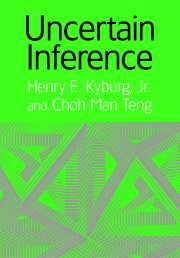Book contents
- Frontmatter
- Contents
- Preface
- 1 Historical Background
- 2 First Order Logic
- 3 The Probability Calculus
- 4 Interpretations of Probability
- 5 Nonstandard Measures of Support
- 6 Nonmonotonic Reasoning
- 7 Theory Replacement
- 8 Statistical Inference
- 9 Evidential Probability
- 10 Semantics
- 11 Applications
- 12 Scientific Inference
- Names Index
- Index
4 - Interpretations of Probability
Published online by Cambridge University Press: 07 December 2009
- Frontmatter
- Contents
- Preface
- 1 Historical Background
- 2 First Order Logic
- 3 The Probability Calculus
- 4 Interpretations of Probability
- 5 Nonstandard Measures of Support
- 6 Nonmonotonic Reasoning
- 7 Theory Replacement
- 8 Statistical Inference
- 9 Evidential Probability
- 10 Semantics
- 11 Applications
- 12 Scientific Inference
- Names Index
- Index
Summary
Introduction
In Chapter 3, we discussed the axioms of the probability calculus and derived some of its theorems. We never said, however, what “probability” meant. From a formal or mathematical point of view, there was no need to: we could state and prove facts about the relations among probabilities without knowing what a probability is, just as we can state and prove theorems about points and lines without knowing what they are. (As Bertrand Russell said [Russell, 1901, p. 83] “Mathematics may be defined as the subject where we never know what we are talking about, nor whether what we are saying is true.”)
Nevertheless, because our goal is to make use of the notion of probability in understanding uncertain inference and induction, we must be explicit about its interpretation. There are several reasons for this. In the first place, if we are hoping to follow the injunction to believe what is probable, we have to know what is probable. There is no hope of assigning values to probabilities unless we have some idea of what probability means. What determines those values? Second, we need to know what the import of probability is for us. How is it supposed to bear on our epistemic states or our decisions? Third, what is the domain of the probability function? In the last chapter we took the domain to be a field, but that merely assigns structure to the domain: it doesn't tell us what the domain objects are.
There is no generally accepted interpretation of probability.
- Type
- Chapter
- Information
- Uncertain Inference , pp. 68 - 97Publisher: Cambridge University PressPrint publication year: 2001



